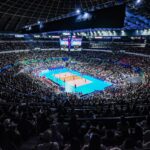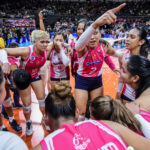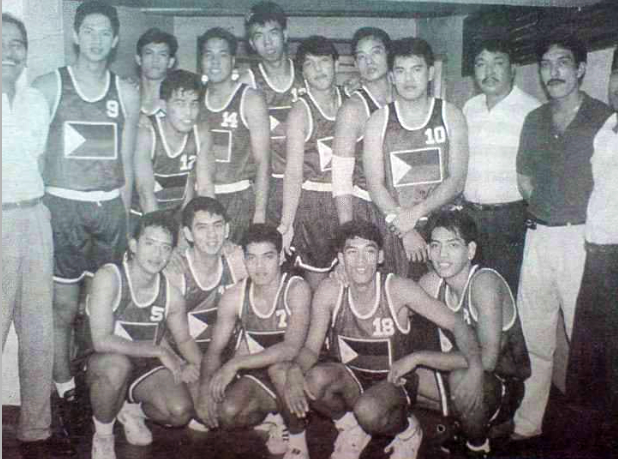On December 4, 1991, the Philippine men’s basketball team achieved redemption by securing the gold medal in the 16th Southeast Asian Games held in Manila. The RP Team swept the tournament, winning all five of its games, including the battle for the gold medal against Thailand. They beat the stubborn Thais, 77-72, in front of more than 25,000 spectators at the historic Araneta Coliseum.
Two years prior, the men’s team suffered a heartbreaking setback against host Malaysia in their second game, 107-99, to settle for the silver medal. There were no finals in Kuala Lumpur. Instead, the country with the best record after the four-game elimination round would win the coveted gold, a format that favored the host country. Gerry Esplana, in an interview on Episode 103 of the online sports program An Eternity of Basketball, recalls the difficulty of going up against the odds. “Bugbugan yung schedule, yung first game namin was against Thailand agad, yun Malaysia kalaban ang Singapore. The next day, Malaysia na ang kalaban namin, magkasunod na araw. Eh yun laban naming versus Thailand, nagkaroon pa ng free-for-all.” The Philippines came from behind to defeat Thailand, 97-93, while Malaysia had an easier time disposing of Singapore, 106-93.
Esplana then added, “Nung nagpa-praktis kami, biglang nawalan ng kuryente, eh one hour lang ang practice time binibigay. Mamamatay ng mga 20 minutes kaya halos 40 minutes na lang natira, may stretching time pa, kaya halos shooting na lang kami at di na scrimmage.” Esplana admitted though, that “may kakulangan din naman kami as a team, we started off flat against Malaysia, they led by 20-plus points. By the time we woke up, it was too late, we were able to bring the lead down to six points. Yun ang pagkakamali kasi isang labanan lang yan, di ka makakabawi.”
1995 PBA MVP Vergel Meneses, when he guested on Episode 87 of AEOB, also shared his own experience in the 1989 joust. “Pina-ikot ikot kami sa bus, yun pala, 15 minute-walk lang pala yun distance ng venue sa hotel namin.” Meneses also cited the new format that came as a surprise for them. “Ang alam namin, may finals pa, featuring the top two teams. Nagulat na lang kami, sa pagkakatanda ko, na after the eliminations at nanalo ang Malaysia against all four teams, champion na daw sila.” The traditional format was to have a finals game between the top two teams but the discretion of having the format changed lay solely on the organizing hosts.
The loss was particularly devastating for the country. It didn’t help that the entire delegation in the Southeast Asian Games ended up with only 26 gold medals, finishing fifth overall in the medal standings. But this would have been less emotional had the country won the top prize in the sport that Filipinos valued the most.
At the same time, the top amateurs moved to the PBA in 1989, assembling perhaps the best rookie draft in league history. As such, Coach Derrick Pumaren had to settle with a hastily-formed lineup featuring amateur and collegiate players like Jun Limpot, Vergel Meneses, Gerry Esplana, Dong Postanes, Apet Jao, Jun Reyes, Gido Babilonia, Vic Pablo, Johnedel Cardel, Bonel Balingit, Larry Villanil and Carlito Mejos.
Open basketball
There was a surge of national interest in basketball during this particular period. With the FIBA allowing open basketball, the Philippines was the first country in the world to suit up professional players its national team, doing so in the 1990 Beijing Asian Games. The stunning loss to China, 14 months after the KL SEAG debacle, meant two biting realizations for Filipino fans – that the Philippines is not the best basketball-playing country in Asia and its amateur players may not be good enough to dominate the SEA region.
RELATED: When the RP Dream Team faced China in the 1990 Asian Games
The Basketball Association of the Philippines (BAP) tried to make the PBA change its mind regarding its previous commitment to play only in the quadrennially-held Asian Games. Given that the Asian Basketball Confederation (ABC) tournament was more prestigious and that the winning team would represent the region to the 1992 Barcelona Olympics, the BAP wanted PBA players to reinforce the country to the 1991 ABC in Kobe, Japan. When the PBA balked, the BAP heeded the advice of then Senator Rene Saguisag, who wrote in his column in the Manila Times that “failure to prepare is preparing to fail,” they were able to convince Sta. Lucia to sponsor the national team. Francis Rodriguez was tapped to handle the team to play in Kobe and then, the Manila SEA Games. Previous to this, Rodriguez steered the Philippine youth team to fourth place in the FIBA-Asia U-19 tournament in Nagoya in 1990.
The absence of the pros participating in the ABC made the BAP officials concede that we had no chance of gaining a slot in the Olympics. They decided then to use the ABC tournament as part of their preparation for their quest to regain the gold medal in the SEA Games.
The Nagoya ABC joust
Rodriguez announced a national team tryout to be conducted at the Acropolis Gym in Quezon City. Twenty-nine players, mostly from the PBL, were invited to be part of the pool. These included Crispa’s Johnny Abarrientos, Eric Quiday, Gil Lumberio, Allan Garrido, Jun Jabar, Kevin Ramas and Vic Pablo; Sta. Lucia’s Marlou Aquino, Macky De Joya, Tony Dela Cerna, Giovanni Pineda, Cris Bade and Boyet Fernandez; Mama’s Love’s Peter Naron, Mark Anthony Tallo and Bong Solomon; Magnolia’s Nonoy Chuatico, John Cardel, Jun Limpot, Bonel Balingit and Jack Santiago; Triple V’s Allan Sasan and Jolly Escobar; A&W’s Joey Guanio, Mulong Orillosa and Eric Reyes; RFM Swift’s Vergel Meneses and Eton Navarro; and RC Cola’s Bong Ravena. Conspiciously missing in this pool was EJ Feihl of Crispa, the tallest player in the PBL at 7’1. Named as assistant coaches were Roehl Nadurata of Swift and Rodriguez’s assistant at Sta. Lucia, Adonis Tierra.
The list was eventually pruned down to twelve players and two alternates. Named to the team were Aquino, Limpot, Solomon, Escobar, Pablo, De Joya, Meneses, Ravena, Sasan, Abarrientos, Fernandez and Chuatico. Alternates were Reyes, Bade and Dela Cerna. It would be interesting to note that all 15 players eventually went on to play in the PBA, with Meneses and Abarrientos becoming MVP awardees.
In the ABC, the Philippine team was bracketed in Group A with China, Bahrain, Kuwait and Malaysia. They defeated Bahrain, 107-83, Kuwait, 77-59, and Malaysia, 126-77, but lost to China, 107-79. The second-place finish in the bracket allowed them to move to the quarterfinal round where they were grouped with South Korea, North Korea and Japan. They lost to the hosts, 110-83, in a game marred by alleged spotty officiating. Rodriguez lamented, “Ang sama ng tawagan, sobrang dami ng bad calls and non-calls. Yun malalaki natin, kinargahan nila agad ng fouls.” The loss led to another defeat, this time to the Sokors, 96-83, before the team ended the quarterfinals on a winning note, defeating North Korea, 87-86. Aquino was the game hero when he sank two pressure-packed free throws in the last three seconds after getting the offensive rebound and being fouled by Chiong Yong-man.
In the classification round, the men’s team lost to Iran, 91-81, relegating them to the battle for seventh place. The Jordanians eventually forfeited this game, handing the Philippines the seventh-place finish. China won the tournament, defeating South Korea, 104-88, with host Japan ending up third after beating Chinese-Taipei, 63-60.
- Spiking popularity: Comparing volleyball’s following in the Philippines and the US

- Cool sweep: How Creamline’s winning formula led to a 7th PVL crown

- Pampanga Dragons celebrate 25th anniversary of MBA championship

- NBA app launches personalization features, live game experience

- Dante Silverio celebrates 86th birthday in style

The SEA Games basketball tournament
The organizing committee decided to bring back the old format where all teams would play a single round robin with the top two teams tangling for the gold medal in the finals. The Philippines were installed as heavy favorites, not only because they served as the hosts but also with how they mangled defending champion Malaysia in the ABC.
Worried though that Malaysia may not have fielded their best team in the ABC, Philippine Sports Commissioner chairman Cecil Hechanova batted for the inclusion of PBA players in the final roster. Given that the PBA adjusted its schedule after the semifinals in the 1991 Third Conference to give way to the two-week biennial event, league officials, according to Hechanova, were willing to lend players from the six teams that didn’t make the semifinals (these teams would have been Formula Shell, Swift and Purefoods). This did not materialize though as Philippine team manager Buddy Encarnado felt that the same team that played in the ABC would be competitive enough to win the gold medal in front of the home crowd.
Only five countries competed – Thailand, Malaysia, Indonesia, Singapore and the Philippines. The Philippines went to work immediately, beating Singapore, 98-56, then Indonesia by 23 points, 82-59, before massacring Thailand by 37, 92-55. They then exacted revenge against the defending champs, 87-69. Malaysia kept the game close courtesy of Tan Kim Cheng’s seven triples to come within 10 points, 64-54, midway in the second half.

Rodriguez was able to utilize all his 12 players in the eliminations because of the huge margin of victories. His normal starting unit had Abarrientos at the point, Chuatico at shooting guard, Meneses as small forward, Limpot at power forward and Aquino at the slot.
But danger loomed as Thailand stunned Malaysia, 87-67, in Day 2 of the tournament. With the loss to the Philippines, the Malaysians dropped out of the race for the gold while Thailand lived up to its end by beating Singapore in their last game, 79-65.
Rodriguez has predicted that it would be Thailand, not Malaysia, who would be their biggest threat. Their 20-point win against Malaysia proved providential. But fans felt that Rodriguez was merely managing expectations, and their 37-point victory was evidence that they can easily beat the Thais in the gold medal match.
The gold medal game
In the first four games, it was Limpot who topped scoring honors for the team, averaging 18.25 points while adding 10.75 boards, 1.75 assists, 4.0 steals, and a blocked shot per game in 31 minutes. Meneses, the crowd darling with his daredevil penetrations, normed 13.75 points, 2.25 boards, 3.25 dimes, 1.25 steals, and 0.25 blocks in 20 minutes of action. Aquino was obviously the dominant interior player, scoring 14.75, 9.75 rebounds, 1 assist, 1.25 steals and an intimidating 3.25 blocked shots per game in 27 minutes. Abarrientos played sparingly in the eliminations because of a sprained ankle as Rodriguez opted to put him for only 18 minutes a game where he averaged 3.5 points, 4.25 boards, 6.5 dimes and 1.75 steals.
Encarnado was confident of a win. He explained that “by winning the gold, we’ll be leaving a legacy for amateur cagers. They’ll be assured of representing the country in future SEA Games competitions. Bayaan na nila ang amateurs ditto. Huwag na sanang pakialaman ito ng pros. Dapat ay doon na lang ang pros sa ABC, Asian Games at Olympics kung saka-sakali.”
Playing in front of a roaring and loud crowd of more than 25,000 people at the Big Dome, the nationals went to work right away, taking a commanding 46-34 lead at the half. But the second half was a different story, and the Thais put pressure on the nationals while employing a rigid zone defense. Meneses remembered this clearly. “Bumaba yun lead to seven points ata kahit na lamang kami ng double digits nun halftime.” But the nationals, buoyed by a raucous crowd that never gave up on them, held on to a 77-72 victory, anchored on Limpot’s 18 points.
Meneses then attributed the victory to the home crowd. “Iba talaga kapag sa sarili mong bansa ka naglalaro, napakalaking puntos talaga sa amin yun, yung kumpiyansa namin, nag-rally ang Thailand, hindi nawala ang focus namin. Kasi syempre, ayaw mo mapahiya, sa dami ng nanonood sayo, ang habol talaga namin ay mapasaya ang lahat.”
The victory wasn’t pretty but this did not turn off the millions of Filipinos tuned live into the games over the People’s Television network. In Encarnado’s words, the victory wasn’t just a win for the Filipino people, but also to amateur basketball as a mixture of pros and amateurs in the national team playing in the SEA Games would have been some kind of overkill. The gold medal turned out to be especially meaningful, the triumph of an all-amateur team in the early age of open basketball increasing the value of the gold medal by tenfold.
